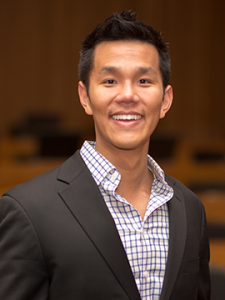

We’re thrilled to officially welcome Dr. Eric Kim as assistant professor in the health area.
Join us in congratulating Dr. Eric Kim, who received the Springer Early Career Achievement Award in Research on Adult Development and Aging, from Division 20 of the American Psychology Association.
This award honours an individual whose work has made significant early career contributions to understanding critical issues in the psychology of adult development and aging.
Dr. Kim’s research focuses on studying the rapidly aging population. While aiming to identify, understand, and intervene upon the dimensions of psychological well-being that reduce the risk of age-related conditions, Dr. Eric Kim is trying to inspire the re-imagining of the last third of life to be more fulfilling.
In a Q&A, Dr. Kim, who joined the department of psychology as assistant professor on July 1, 2020, shares his research and how a certain role model sparked his interest in adult development and aging.
First of all, can you tell us a little about yourself?
I grew up in New York, went to undergrad and grad school at the University of Michigan (in psychology and then clinical psychology), and then received additional training at the Harvard School of Public Health in Cardiovascular Epidemiology and Biostatstics as a Postdoctoral Fellow. I then stayed on as a Research Associate and Research Scientist. I enjoy a good laugh, being intrigued, and love the energy that great collaborations generate! Along the entire way, I have been taught by tremendous mentors and I’m incredibly grateful to all of them.
What kinds of questions do you try to answer through your research?
My research aims to identify, understand, and intervene upon the dimensions of psychological well-being (with a particular interest in the topic of sense of purpose in life) that might reduce the risk of age-related conditions. This research also aims to understand the influence that the social environment has on the connection between psychological well-being and physical health. I like to integrate perspectives from multiple fields of psychology, as well as insights from other disciplines including gerontology, social epidemiology, biology, biostatistics, and translational science. In all of my work, I’m particularly interested in our rapidly aging population.
Can you give us an example of this in our daily lives?
If you’ve ever witnessed friends or relatives get “derailed” after they retire and they were unable to “re-purpose” their lives, their health and well-being might have declined over time. On the other hand, you might have noticed friends or relatives who had a very compelling “ultimate concern,” and one of the side effects might have been that they had extra motivation to maintain their health and well-being as they continued valiantly striving toward that “ultimate concern” late into older adulthood. There are of course many nuances and wide variation when we actually look at the lives of individuals, however, I’ve spent quite a bit of time trying to empirically test these hypotheses that people commonly discuss at a population-level. I plan to move on and study the interesting subgroups that lie within broader populations as well.
How did you become interested in this line of research?
There is an array of factors that cultivated my interest in this line of research. However, the overarching influencing force was my grandfather. He was the leader of a large orphanage in South Korea and very healthy the entire time. There’s a mandatory retirement age, and after his retirement he wasn’t quite the same and I witnessed a long arc of gradual decline. My grandfather was a wonderful and positive role model in my life, so I often wondered what the driving factors behind his decline were as I was witnessing his decline throughout my childhood, and here I am today still trying to figure it out! Thinking about this topic for many years has led to other related questions that excite me. For example, in the last ~100 years our average life expectancies have increased by almost 30 years, but we don’t have a particularly good social infrastructure for all those additional years of life. The structural lag of our society’s core institutions (families, education system, workplaces, healthcare system, housing, design of neighborhoods, etc.) have not been adequately updated to serve the increasingly older age distribution that we are approaching. At the macro level, what policies and norms can we create that will help people live more fulfilling and purposeful lives in older adulthood? And at a more micro-level, what interventions can we create which will help serve this same goal? This is a particularly important time to think about these questions, because several societies are experiencing rapidly aging populations around the world.
Can you tell us about any new research that you are particularly excited about?
I’m quite interested in further investigating the underlying biobehavioral mechanisms that might explain why people with higher psychological well-being generally tend to have better health. I’m also interested in factors that might moderate the purpose-physical health connection. For example, do people with an extremely high sense of purpose burn out over time, and/or are they more likely to turn to unhealthy coping behaviors in order to cope with the stress that likely results from pursuing an overarching purpose with unrelenting enthusiasm? Among those who are able to maintain a very high sense of purpose and health over time, how are they doing this? Also, what happens to people’s health and well-being if they have a “self-enhancing” vs. “self-transcending” purpose? How do social networks and society react to such people (e.g., reward and punish them) and how might such reactions gradually impact the trajectory of their health over time?
Do you have a motto?
This is a quote that has always resonated with me and I try to think about it in various domains of life and work. “If you want to build a ship, don’t drum up people to collect wood and don’t assign them tasks and work, but rather teach them to long for the endless immensity of the sea.” (Antoine de Saint-exupery).
What do you like to do in your free time?
As someone on the shyer side, I dove into improv comedy classes last year because I thought it would simultaneously be great fun (having been a fan of “Whose Line Is It Anyway?” growing up) and a way to be more like myself in situations where I was previously too shy to be. I can say that the classes have fulfilled both of these expectations. I also like going to random talks in other disciplines and outside of academia, I like to going to the gym, and I dabble in some indoor rock climbing and outdoor mountain biking. I’m very much looking forward to exploring the great outdoors of Vancouver!


